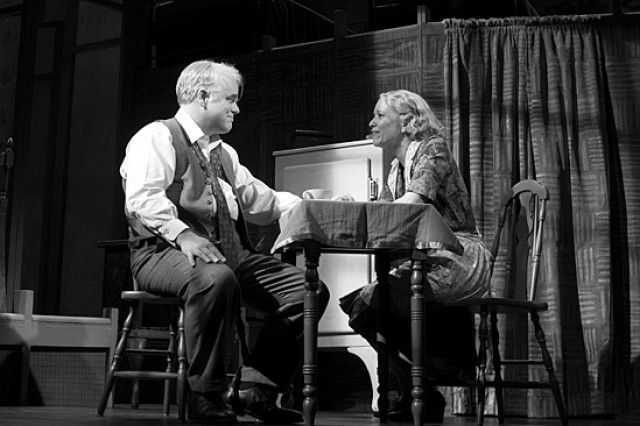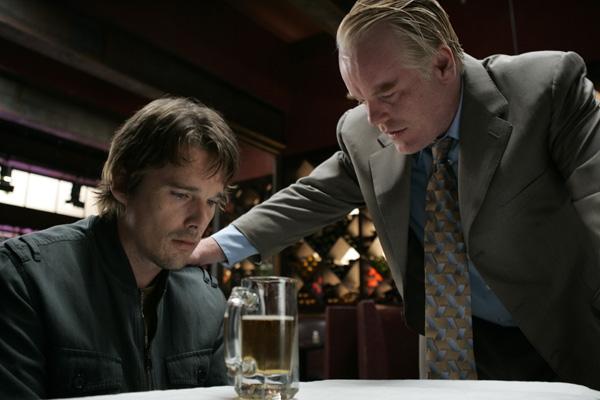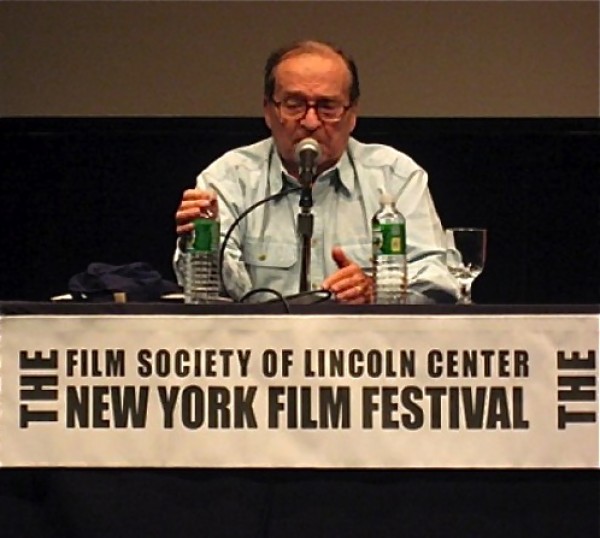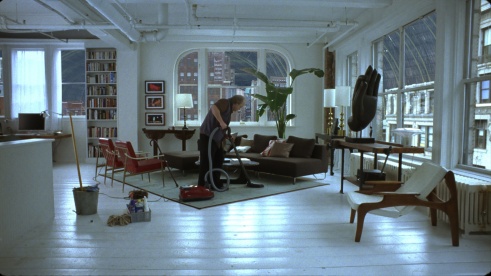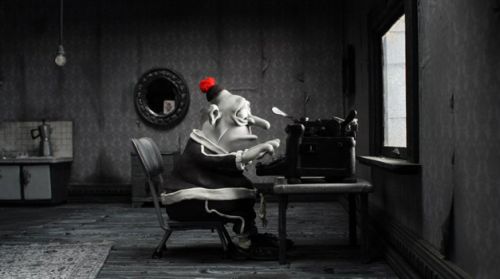MONEYBALL (Bennett Miller, 2011)
Hudson River Park, Pier 63 at 23rd St.
Wednesday, July 11, free, dusk
www.moneyball-movie.com
www.riverflicks.com/RFgrownups.html
 After winning 102 games during the 2001 season but then falling to the New York Yankees in the American League Division Series in five tough games, the cash-poor Oakland A’s also lost three of their most prominent players, Jason Giambi, Johnny Damon, and Jason Isringhausen, to free agency. To rebuild the team with limited funds, general manager Billy Beane (Brad Pitt) turns to an unexpected source: Peter Brand (Jonah Hill), a young stat geek who believes that on-base percentage is the key to the game. The A’s scouts find it hard to believe that Beane is looking at has-been catcher Scott Hatteberg (Chris Pratt), aging outfielder David Justice (Stephen Bishop), and underperforming submariner Chad Bradford (Casey Bond) to get the A’s to the World Series, as does manager Art Howe (Philip Seymour Hoffman), who refuses to use the new players the way Beane insists. But when the A’s indeed start winning after a few more questionable deals pulled off by Beane and Brand, the entire sport world starts taking a much closer look at what is soon known as “moneyball.” Based on the 2003 bestseller Moneyball: The Art of Winning an Unfair Game by Michael Lewis, Moneyball is an exciting film even though the vast majority of it occurs off the field. Pitt is wonderfully understated as Beane, a former five-tool prospect for the Mets and divorced father of a twelve-year-old girl (Kerris Dorsey). Pitt earned an Oscar nod for Best Actor for his portrayal of the real-life Beane, a confident but nervous man who may or may not have a big chip on his shoulder. Hill was nominated for Best Supporting Actor for his role as wiz-kid Brand, a fictional character inspired by Paul DePodesta, who refused to let his name and likeness be used in the film; Brand instead is an amalgamation of several of the people who work for Beane. Director Bennett Miller (The Cruise, Capote) takes the viewer into a number of fascinating back-room dealings, including a revealing scene in which Beane tries to acquire Ricardo Rincon from the Cleveland Indians, furiously working the phones to pull off the deal. Also nominated for Best Picture, Best Editing, Best Sound Mixing, and Best Adapted Screenplay, Moneyball firmly belongs in the playoff pantheon of great baseball movies, with the added bonus that you don’t have to be a fan or know a lot about the game to get sucked into its intoxicating tale. Moneyball is screening July 11 at Hudson River Park’s Pier 63, kicking off the free River Flicks for Grown-Ups series, which continues through August 22 with such films as Super 8, Bridesmaids, Limitless, Cowboys & Aliens, Crazy, Stupid Love, and Horrible Bosses. For a day-by-day listing of free summer movie screenings in New York City, go here.
After winning 102 games during the 2001 season but then falling to the New York Yankees in the American League Division Series in five tough games, the cash-poor Oakland A’s also lost three of their most prominent players, Jason Giambi, Johnny Damon, and Jason Isringhausen, to free agency. To rebuild the team with limited funds, general manager Billy Beane (Brad Pitt) turns to an unexpected source: Peter Brand (Jonah Hill), a young stat geek who believes that on-base percentage is the key to the game. The A’s scouts find it hard to believe that Beane is looking at has-been catcher Scott Hatteberg (Chris Pratt), aging outfielder David Justice (Stephen Bishop), and underperforming submariner Chad Bradford (Casey Bond) to get the A’s to the World Series, as does manager Art Howe (Philip Seymour Hoffman), who refuses to use the new players the way Beane insists. But when the A’s indeed start winning after a few more questionable deals pulled off by Beane and Brand, the entire sport world starts taking a much closer look at what is soon known as “moneyball.” Based on the 2003 bestseller Moneyball: The Art of Winning an Unfair Game by Michael Lewis, Moneyball is an exciting film even though the vast majority of it occurs off the field. Pitt is wonderfully understated as Beane, a former five-tool prospect for the Mets and divorced father of a twelve-year-old girl (Kerris Dorsey). Pitt earned an Oscar nod for Best Actor for his portrayal of the real-life Beane, a confident but nervous man who may or may not have a big chip on his shoulder. Hill was nominated for Best Supporting Actor for his role as wiz-kid Brand, a fictional character inspired by Paul DePodesta, who refused to let his name and likeness be used in the film; Brand instead is an amalgamation of several of the people who work for Beane. Director Bennett Miller (The Cruise, Capote) takes the viewer into a number of fascinating back-room dealings, including a revealing scene in which Beane tries to acquire Ricardo Rincon from the Cleveland Indians, furiously working the phones to pull off the deal. Also nominated for Best Picture, Best Editing, Best Sound Mixing, and Best Adapted Screenplay, Moneyball firmly belongs in the playoff pantheon of great baseball movies, with the added bonus that you don’t have to be a fan or know a lot about the game to get sucked into its intoxicating tale. Moneyball is screening July 11 at Hudson River Park’s Pier 63, kicking off the free River Flicks for Grown-Ups series, which continues through August 22 with such films as Super 8, Bridesmaids, Limitless, Cowboys & Aliens, Crazy, Stupid Love, and Horrible Bosses. For a day-by-day listing of free summer movie screenings in New York City, go here.


 In films such as Being John Malkovich (Spike Jonze, 1999), Adaptation. (Spike Jonze, 2002), Confessions of a Dangerous Mind (George Clooney, 2002), and Eternal Sunshine of the Spotless Mind (Michel Gondry, 2004), writer Charlie Kaufman has created bizarre, compelling alternate views of reality that adventurous moviegoers have embraced, even if they didn’t understand everything they saw. Well, Kaufman has done it again, challenging audiences with his directorial debut, the very strange but mesmerizing Synecdoche, New York. Philip Seymour Hoffman stars as the bedraggled Caden Cotard, a local theater director in Schenectady mounting an inventive production of Death of a Salesman. Just as the show is opening, his wife, avant-garde artist Adele Lack (Catherine Keener), decides to take an extended break in Europe with their four-year-old daughter, Olive (Sadie Goldstein), and Adele’s kooky assistant, Maria (Jennifer Jason Leigh). As Caden starts coming down with a series of unexplainable health problems (his last name, by the way — Cotard — is linked with a neurological syndrome in which a person believes they are dead or dying or do not even exist), he wanders in and out of offbeat personal and professional relationships with box-office girl Hazel (a nearly unrecognizable Samantha Morton), his play’s lead actress, Claire Keen (Michelle Williams), his therapist, Madeleine Gravis (Hope Davis), and Sammy (Tom Noonan), a man who has been secretly following him for years. After winning a MacArthur Genius Grant, Caden begins his grandest production yet, a massive retelling of his life story, resulting in radical shifts between fantasy and reality that will have you laughing as you continually scratch your head, hoping to stimulate your brain in order to figure out just what the heck is happening on-screen.
In films such as Being John Malkovich (Spike Jonze, 1999), Adaptation. (Spike Jonze, 2002), Confessions of a Dangerous Mind (George Clooney, 2002), and Eternal Sunshine of the Spotless Mind (Michel Gondry, 2004), writer Charlie Kaufman has created bizarre, compelling alternate views of reality that adventurous moviegoers have embraced, even if they didn’t understand everything they saw. Well, Kaufman has done it again, challenging audiences with his directorial debut, the very strange but mesmerizing Synecdoche, New York. Philip Seymour Hoffman stars as the bedraggled Caden Cotard, a local theater director in Schenectady mounting an inventive production of Death of a Salesman. Just as the show is opening, his wife, avant-garde artist Adele Lack (Catherine Keener), decides to take an extended break in Europe with their four-year-old daughter, Olive (Sadie Goldstein), and Adele’s kooky assistant, Maria (Jennifer Jason Leigh). As Caden starts coming down with a series of unexplainable health problems (his last name, by the way — Cotard — is linked with a neurological syndrome in which a person believes they are dead or dying or do not even exist), he wanders in and out of offbeat personal and professional relationships with box-office girl Hazel (a nearly unrecognizable Samantha Morton), his play’s lead actress, Claire Keen (Michelle Williams), his therapist, Madeleine Gravis (Hope Davis), and Sammy (Tom Noonan), a man who has been secretly following him for years. After winning a MacArthur Genius Grant, Caden begins his grandest production yet, a massive retelling of his life story, resulting in radical shifts between fantasy and reality that will have you laughing as you continually scratch your head, hoping to stimulate your brain in order to figure out just what the heck is happening on-screen.